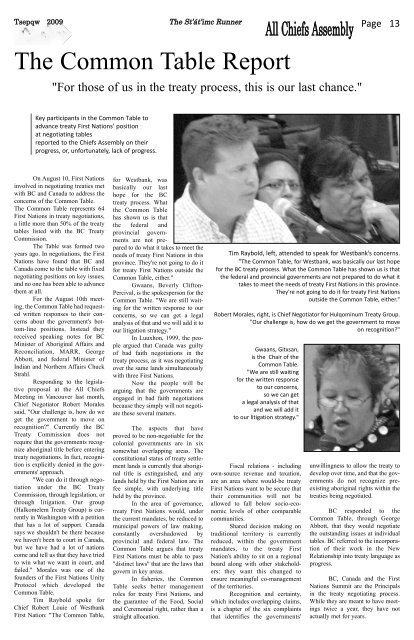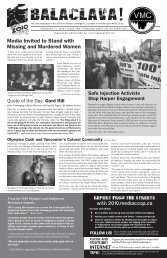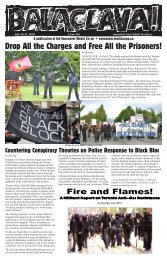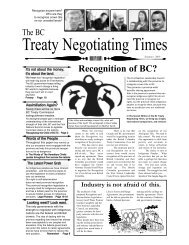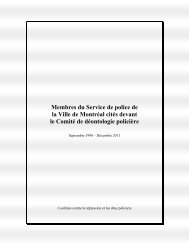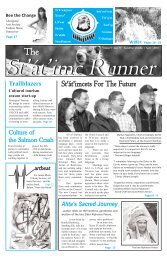St’át’imc Runner
september fp 09_Layout 1 - The Media Co-op
september fp 09_Layout 1 - The Media Co-op
You also want an ePaper? Increase the reach of your titles
YUMPU automatically turns print PDFs into web optimized ePapers that Google loves.
Tsepqw 2009<br />
The <strong>St’át’imc</strong> <strong>Runner</strong><br />
The Common Table Report<br />
All Chiefs Assembly<br />
"For those of us in the treaty process, this is our last chance."<br />
Page 13<br />
Key participants in the Common Table to<br />
advance treaty First Nations’ position<br />
at negotiating tables<br />
reported to the Chiefs Assembly on their<br />
progress, or, unfortunately, lack of progress.<br />
On August 10, First Nations<br />
involved in negotiating treaties met<br />
with BC and Canada to address the<br />
concerns of the Common Table.<br />
The Common Table represents 64<br />
First Nations in treaty negotiations,<br />
a little more than 50% of the treaty<br />
tables listed with the BC Treaty<br />
Commission.<br />
The Table was formed two<br />
years ago. In negotiations, the First<br />
Nations have found that BC and<br />
Canada come to the table with fixed<br />
negotiating positions on key issues,<br />
and no one has been able to advance<br />
them at all.<br />
For the August 10th meeting,<br />
the Common Table had requested<br />
written responses to their concerns<br />
about the government's bottom-line<br />
positions. Instead they<br />
received speaking notes for BC<br />
Minister of Aboriginal Affairs and<br />
Reconciliation, MARR, George<br />
Abbott, and federal Minister of<br />
Indian and Northern Affairs Chuck<br />
Strahl.<br />
Responding to the legislative<br />
proposal at the All Chiefs<br />
Meeting in Vancouver last month,<br />
Chief Negotiator Robert Morales<br />
said, "Our challenge is, how do we<br />
get the government to move on<br />
recognition?" Currently the BC<br />
Treaty Commission does not<br />
require that the governments recognize<br />
aboriginal title before entering<br />
treaty negotiations. In fact, recognition<br />
is explicitly denied in the governments'<br />
approach.<br />
"We can do it through negotiation<br />
under the BC Treaty<br />
Commission, through legislation, or<br />
through litigation. Our group<br />
(Halkomelem Treaty Group) is currently<br />
in Washington with a petition<br />
that has a lot of support. Canada<br />
says we shouldn't be there because<br />
we haven't been to court in Canada,<br />
but we have had a lot of nations<br />
come and tell us that they have tried<br />
to win what we want in court, and<br />
failed." Morales was one of the<br />
founders of the First Nations Unity<br />
Protocol which developed the<br />
Common Table.<br />
Tim Raybold spoke for<br />
Chief Robert Louie of Westbank<br />
First Nation: "The Common Table,<br />
for Westbank, was<br />
basically our last<br />
hope for the BC<br />
treaty process. What<br />
the Common Table<br />
has shown us is that<br />
the federal and<br />
provincial governments<br />
are not prepared<br />
to do what it takes to meet the<br />
needs of treaty First Nations in this<br />
province. They're not going to do it<br />
for treaty First Nations outside the<br />
Common Table, either."<br />
Gwaans, Beverly Clifton-<br />
Percival, is the spokesperson for the<br />
Common Table. "We are still waiting<br />
for the written response to our<br />
concerns, so we can get a legal<br />
analysis of that and we will add it to<br />
our litigation strategy."<br />
In Luuxhon, 1999, the people<br />
argued that Canada was guilty<br />
of bad faith negotiations in the<br />
treaty process, as it was negotiating<br />
over the same lands simultaneously<br />
with three First Nations.<br />
Now the people will be<br />
arguing that the governments are<br />
engaged in bad faith negotiations<br />
because they simply will not negotiate<br />
these several matters.<br />
The aspects that have<br />
proved to be non-negotiable for the<br />
colonial governments are in six<br />
somewhat overlapping areas. The<br />
constitutional status of treaty settlement<br />
lands is currently that aboriginal<br />
title is extinguished, and any<br />
lands held by the First Nation are in<br />
fee simple, with underlying title<br />
held by the province.<br />
In the area of governance,<br />
treaty First Nations would, under<br />
the current mandates, be reduced to<br />
municipal powers of law making,<br />
constantly overshadowed by<br />
provincial and federal law. The<br />
Common Table argues that treaty<br />
First Nations must be able to pass<br />
"distinct laws" that are the laws that<br />
govern in key areas.<br />
In fisheries, the Common<br />
Table seeks better management<br />
roles for treaty First Nations, and<br />
the guarantee of the Food, Social<br />
and Ceremonial right, rather than a<br />
straight allocation.<br />
Tim Raybold, left, attended to speak for Westbank’s concerns.<br />
“The Common Table, for Westbank, was basically our last hope<br />
for the BC treaty process. What the Common Table has shown us is that<br />
the federal and provincial governments are not prepared to do what it<br />
takes to meet the needs of treaty First Nations in this province.<br />
They're not going to do it for treaty First Nations<br />
outside the Common Table, either."<br />
Robert Morales, right, is Chief Negotiator for Hulqominum Treaty Group.<br />
"Our challenge is, how do we get the government to move<br />
on recognition?"<br />
Gwaans, Gitxsan,<br />
is the Chair of the<br />
Common Table.<br />
"We are still waiting<br />
for the written response<br />
to our concerns,<br />
so we can get<br />
a legal analysis of that<br />
and we will add it<br />
to our litigation strategy."<br />
Fiscal relations - including<br />
own-source revenue and taxation,<br />
are an area where would-be treaty<br />
First Nations want to be secure that<br />
their communities will not be<br />
allowed to fall below socio-economic<br />
levels of other comparable<br />
communities.<br />
Shared decision making on<br />
traditional territory is currently<br />
reduced, within the government<br />
mandates, to the treaty First<br />
Nation's ability to sit on a regional<br />
board along with other stakeholders:<br />
they want this changed to<br />
ensure meaningful co-management<br />
of the territories.<br />
Recognition and certainty,<br />
which includes overlapping claims,<br />
is a chapter of the six complaints<br />
that identifies the governments'<br />
unwillingness to allow the treaty to<br />
develop over time, and that the governments<br />
do not recognize preexisting<br />
aboriginal rights within the<br />
treaties being negotiated.<br />
BC responded to the<br />
Common Table, through George<br />
Abbott, that they would negotiate<br />
the outstanding issues at individual<br />
tables. BC referred to the incorporation<br />
of their work in the New<br />
Relationship into treaty language as<br />
progress.<br />
BC, Canada and the First<br />
Nations Summit are the Principals<br />
in the treaty negotiating process.<br />
While they are meant to have meetings<br />
twice a year, they have not<br />
actually met for years.


